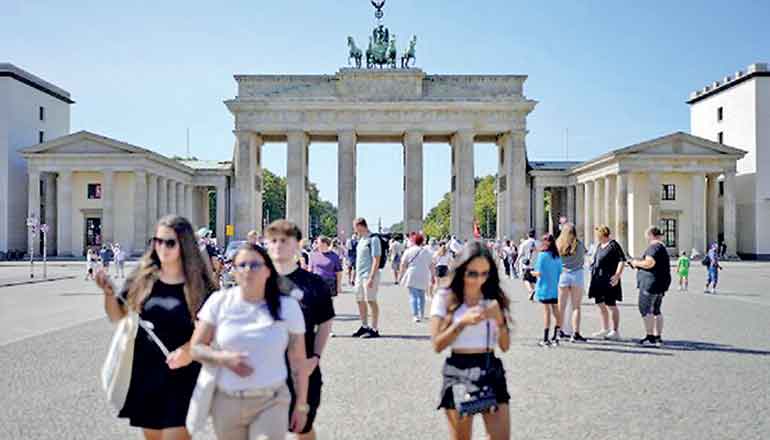Thursday Feb 19, 2026
Thursday Feb 19, 2026
Tuesday, 27 May 2025 00:04 - - {{hitsCtrl.values.hits}}

For the partnership to truly flourish, both countries need to envision a comprehensive bilateral framework that goes beyond aid and trade
 In international diplomacy, some bilateral relationships quietly grow strong without much public attention. The partnership between Germany and Sri Lanka is one such example. Rooted in historical goodwill and sustained through economic cooperation, development aid, and cultural exchanges, it’s a relationship built on substance rather than spectacle. As a Sri Lankan living in Germany, I’ve seen firsthand Germany’s ongoing commitment to Sri Lanka’s development. Beyond this, there’s great potential for a more strategic, multifaceted partnership that benefits both countries in areas like education, climate, and innovation. It’s time to bring this valuable relationship into the spotlight.
In international diplomacy, some bilateral relationships quietly grow strong without much public attention. The partnership between Germany and Sri Lanka is one such example. Rooted in historical goodwill and sustained through economic cooperation, development aid, and cultural exchanges, it’s a relationship built on substance rather than spectacle. As a Sri Lankan living in Germany, I’ve seen firsthand Germany’s ongoing commitment to Sri Lanka’s development. Beyond this, there’s great potential for a more strategic, multifaceted partnership that benefits both countries in areas like education, climate, and innovation. It’s time to bring this valuable relationship into the spotlight.
Historical roots and post-independence ties
Germany recognised Sri Lanka (then Ceylon) shortly after it gained independence in 1948. Diplomatic relations were officially established in 1953, and since then, Germany has been a consistent development partner. During the Cold War, West Germany’s support for Sri Lanka’s economic development was a notable gesture of mutual respect. German development agencies such as GTZ (now GIZ) and KfW played pivotal roles in sectors like vocational training, infrastructure, and healthcare. One of the most visible symbols of early cooperation was the establishment of German technical training institutes across Sri Lanka. These institutions not only equipped young Sri Lankans with valuable skills but also solidified Germany’s reputation as a development partner with long-term vision. Even today, German engineering and training standards are held in high regard in Sri Lanka.
Economic engagement and trade
Germany is one of Sri Lanka’s key trading partners in Europe. As of 2023, it ranks among the top 10 export destinations for Sri Lankan goods. Tea, textiles, rubber products, and spices continue to find loyal markets in Germany. At the same time, Germany exports high-value machinery, automobiles, and industrial equipment to Sri Lanka. The trade relationship is complementary, with strong potential for growth through diversification and value addition. Moreover, German companies are showing increased interest in Sri Lanka’s renewable energy, IT, and tourism sectors.
As Sri Lanka gradually recovers from its recent economic crisis, a window of opportunity has emerged to attract more sustainable investment from Germany—particularly in green technology and digital infrastructure. A bilateral investment treaty could provide much-needed reassurance for potential German investors.
Development cooperation and peacebuilding
Germany has long been one of the most generous bilateral donors to Sri Lanka, offering both technical assistance and financial aid. What sets Germany apart is its focus on sustainability,
capacity building, and social inclusion. German support has played a significant role in promoting vocational education, decentralisation, and the strengthening of health systems. In the aftermath of Sri Lanka’s civil war, German aid shifted toward supporting reconciliation, psychosocial care, and civil society engagement.
German foundations such as Friedrich Ebert Stiftung (FES), Konrad Adenauer Stiftung (KAS), and Heinrich Böll Stiftung (HBS) have been actively involved in promoting human rights, democratic governance, and inter-ethnic dialogue. Given Germany’s growing emphasis on a feminist foreign policy, there is further potential for collaboration on gender equality, women’s empowerment, and peace building—areas that are critical for Sri Lanka’s long-term stability.
The diaspora as a cultural bridge
The Sri Lankan diaspora in Germany, though relatively small (estimated at around 60,000), plays a unique role in strengthening people-to-people ties. Comprising professionals, students, artists, and second-generation youth, the diaspora contributes not only to Germany’s economy but also to its multicultural identity. Sri Lankan temples, cultural associations, and Tamil language schools are visible across cities like Berlin, Hamburg, and Frankfurt. In recent years, diaspora-led initiatives in entrepreneurship, humanitarian aid, and academic exchange have helped bridge the gap between the two societies, offering a bottom-up approach to diplomacy.
There is also a growing number of Sri Lankan students pursuing higher education in Germany, attracted by its tuition-free universities, world-class research facilities, and inclusive visa policies. Many return to Sri Lanka with advanced skills, while others contribute to the German workforce. Encouraging more bilateral academic exchanges and research collaborations could amplify this brain circulation.
Climate, sustainability, and shared priorities
As the world grapples with climate change, Germany and Sri Lanka share common interests in climate resilience, biodiversity protection, and sustainable development. Germany’s expertise in renewable energy and environmental policy could greatly support Sri Lanka’s transition to a greener economy. Joint research on climate adaptation, sustainable agriculture, and disaster management would benefit both nations. Furthermore, Germany’s leadership in global climate diplomacy aligns well with Sri Lanka’s vulnerability to climate shocks. A focused bilateral agenda on environmental cooperation could enhance the relevance of the Germany–Sri Lanka relationship within global climate negotiations.
Looking ahead: A strategic reimagining
The upcoming visit of Sri Lanka’s president to Germany on 10 June presents a timely opportunity to elevate the Germany–Sri Lanka partnership. This visit should not only celebrate the longstanding friendship but also address the relationship in a wider strategic context. While Sri Lanka has recently focused much of its foreign policy attention on neighbouring giants like China and India, it is crucial not to overlook the mutual benefits that a strong partnership with Germany—and the broader European Union—can bring. Germany’s economic strength, technological expertise, and commitment to sustainable development offer avenues for Sri Lanka to diversify its international partnerships and reduce over-dependence on a few large powers.
At the same time, Germany stands to gain from closer ties with Sri Lanka in areas such as trade, renewable energy, tourism, education, and regional stability in the Indian Ocean. The president’s visit could thus serve as a catalyst for forging new agreements, expanding trade relations, and deepening cooperation on security, digital innovation, and climate action. For the partnership to truly flourish, both countries need to envision a comprehensive bilateral framework that goes beyond aid and trade. This includes enhanced diplomatic engagement, cultural exchange, and people-to-people connectivity, supported by active involvement from the diaspora and academic communities.
The upcoming visit of Sri Lanka’s president to Germany on 10 June presents a timely opportunity to elevate the Germany–Sri Lanka partnership. This visit should not only celebrate the longstanding friendship but also address the relationship in a wider strategic context. While Sri Lanka has recently focused much of its foreign policy attention on neighbouring giants like China and India, it is crucial not to overlook the mutual benefits that a strong partnership with Germany—and the broader European Union—can bring. Germany’s economic strength, technological expertise, and commitment to sustainable development offer avenues for Sri Lanka to diversify its international partnerships and reduce over-dependence on a few large powers
Conclusion
The Germany–Sri Lanka relationship is like a quietly flowing river—steady, reliable, and life-sustaining. But in today’s interconnected world, quiet diplomacy sometimes needs amplification. By recognising the untapped potential and investing in deeper, strategic engagement, both countries stand to gain. The upcoming presidential visit is a perfect moment to shine a brighter spotlight on this partnership. It is time for Germany and Sri Lanka to raise their collaboration to a new level—one that reflects shared values, common challenges, and a vision for mutual prosperity. This is a partnership that deserves not only louder recognition but also a renewed and ambitious vision for the future.
(The writer holds a BA (Hons), MA & PhD – Japan. He is a former PSI Fellow in Berlin and Peace Researcher currently based in Berlin.)